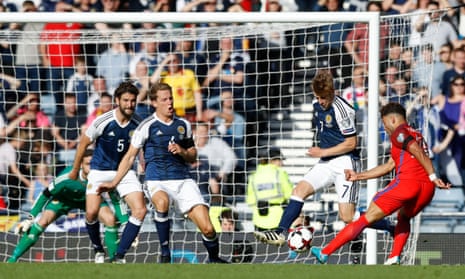After a Premier League season in which three-man defences have experienced a sudden resurgence, Gordon Strachan surprised England by using that system in an attempt to provide extra defensive security – and succeeded in frustrating Gareth Southgate’s side for long periods.
Of course, with England dominating possession of the 2-2 World Cup qualifying draw at Hampden Park for long periods, Scotland’s shape generally looked more like a 5-4-1 system, with wing-backs Andrew Robertson and Ikechi Anya pinned back behind the ball with only sporadic opportunities to demonstrate their attacking capabilities.
Faced with the task of breaking down an extremely deep, compact defence, England struggled. The paucity of options in central midfield was obvious, with the extremely functional combination of Eric Dier and Jake Livermore deployed in front of the defence. Dier at least attempted to play penetrative passes and his lovely chip over the top for Tottenham team-mate Harry Kane was a rare moment of inspiration in the first half, but he was also guilty of too many hopeful, wasteful passes – which at one point prompted a rollicking from centre-back Gary Cahill for conceding possession cheaply. Livermore was neat and tidy, spreading play out wide reliably but England also had difficulties down the flanks.
Both full-backs seemed reluctant to push forward too much, probably under instructions from Southgate, which meant the wingers often found themselves isolated. Marcus Rashford charged up and down the touchline manfully but is plainly not a right-winger, and Southgate is unlikely to repeat his decision to use the Manchester United attacker over proper wide options such as Raheem Sterling or Alex Oxlade-Chamberlain.
On the opposite flank Adam Lallana again demonstrated his ability to get England playing neat passing moves, drifting inside intelligently. One move, which featured Ryan Bertrand overlapping and England playing a dangerous ball into the six-yard box, was England’s best combination play all game. Dele Alli was quiet in his No10 role. He was flattened by a hefty early Scott Brown challenge, and then struggled to find space.
Scotland attempted to play purely on the counterattack. Their centre-forward Leigh Griffiths battled against Cahill and Chris Smalling, working the channels and making a nuisance of himself, but received little support from the wide roles. Robert Snodgrass continues to underwhelm at international level, while Stuart Armstrong pushed forward well but often made the wrong decisions in possession.
Anya provided speed down the right, while Robertson offers good quality on the overlap but should have done better when snatching at a second-half chance.
England’s breakthrough came after Southgate had corrected his initial mistake, replacing Rashford with a more natural right-winger, Oxlade-Chamberlain. Suddenly the visitors had a player attempting to go past opponents and it took just five minutes for the Arsenal man to open the scoring, cutting inside from the right and hitting a shot Craig Gordon got a hand to. He was perhaps unsighted but certainly made a meal of his attempted save.
Strachan responded by introducing a proper No9, Chris Martin, as Scotland went direct in the closing stages. They created little from open play but the Derby County man caused problems and provided England’s centre-backs with a different test. Scotland won two free-kicks in almost identical situations in the final five minutes, both of which were powered into the net by Griffiths – one curling away to Joe Hart’s left, the other drifting back inside to the right.
But England spoiled the party with Kane’s stoppage-time equaliser from substitute Sterling’s deep cross, which underlined how Scotland often defend those situations poorly – in the reverse fixture last November, a 3-0 England victory, all three goals were headers. It will also have infuriated Strachan that Scotland turned over possession at the exact moment they appeared to be launching a three-on-two break. Those poor counterattacking decisions were a feature of Scotland’s play, and they must become better at transitions to play this deep, defensive approach with any kind of success. England, meanwhile, must improve the tempo of their passing to break down deep opponents. Neither side impressed.
